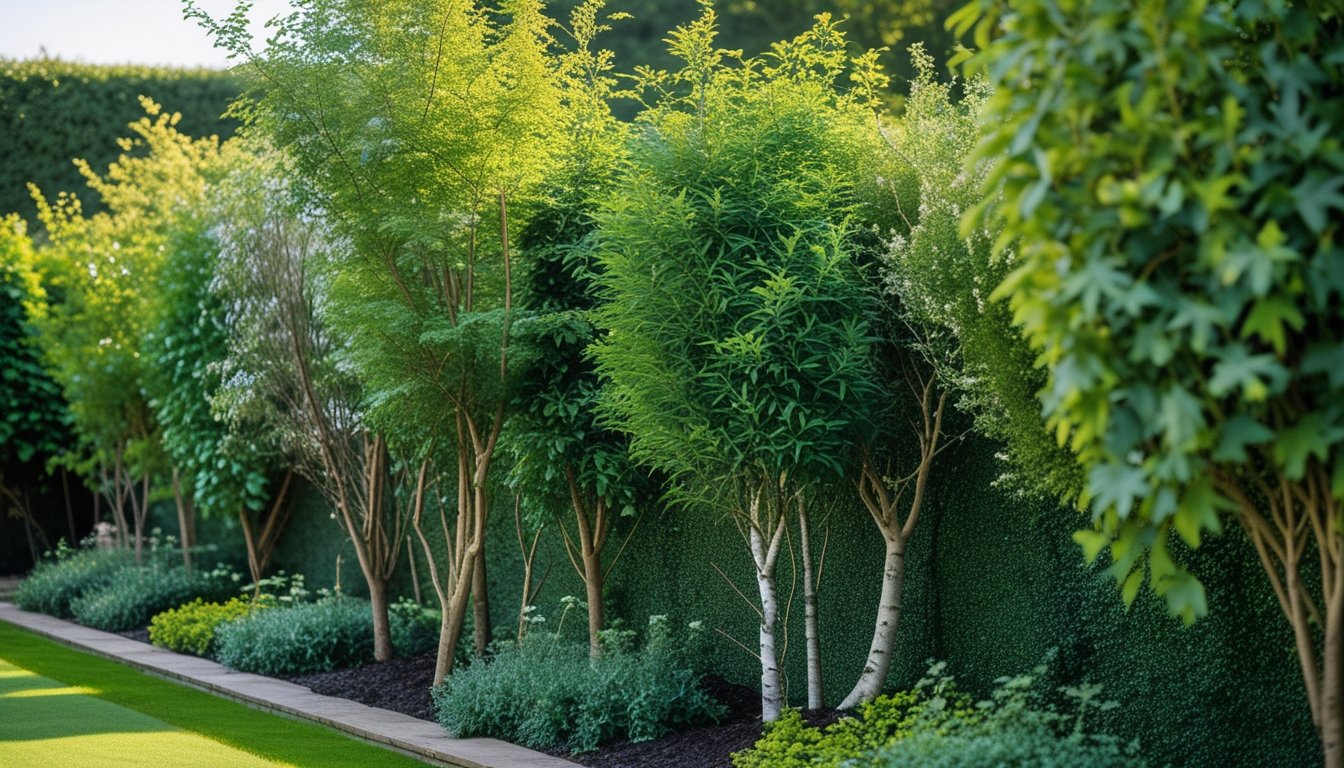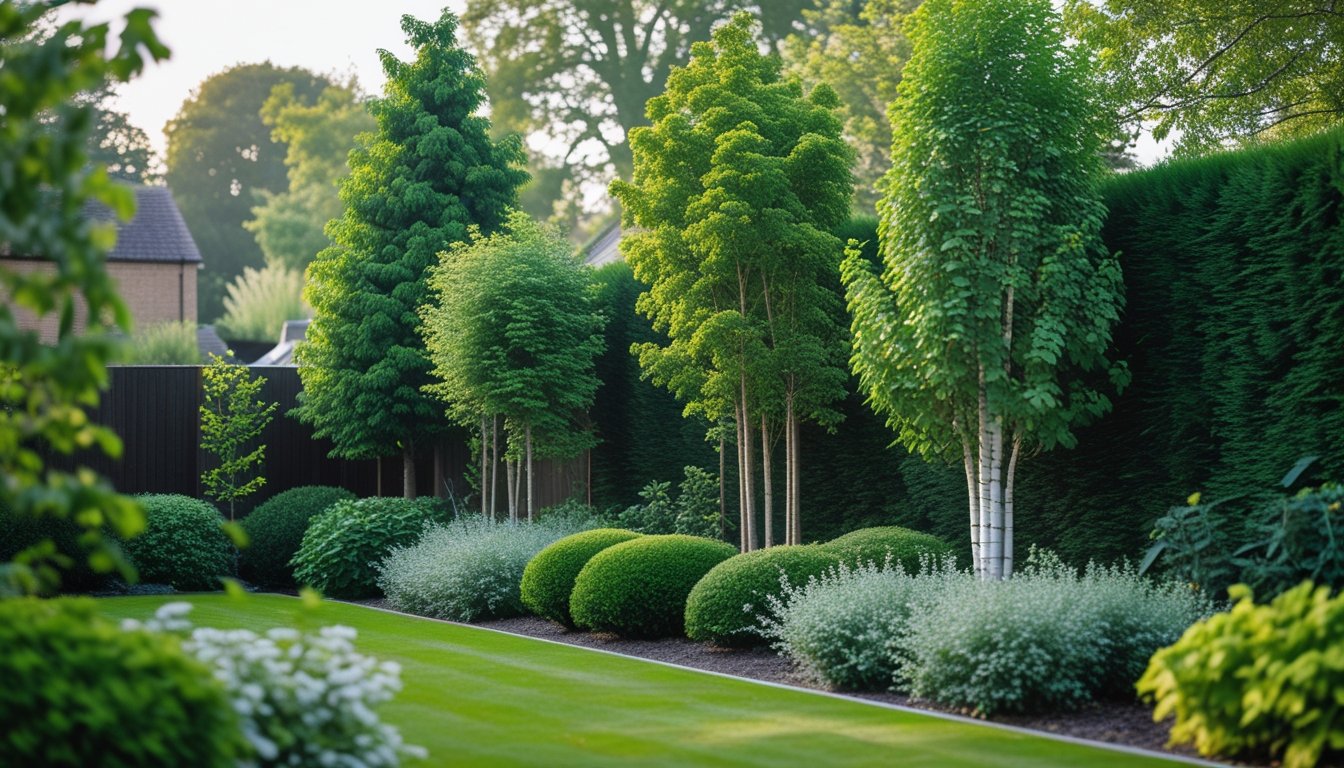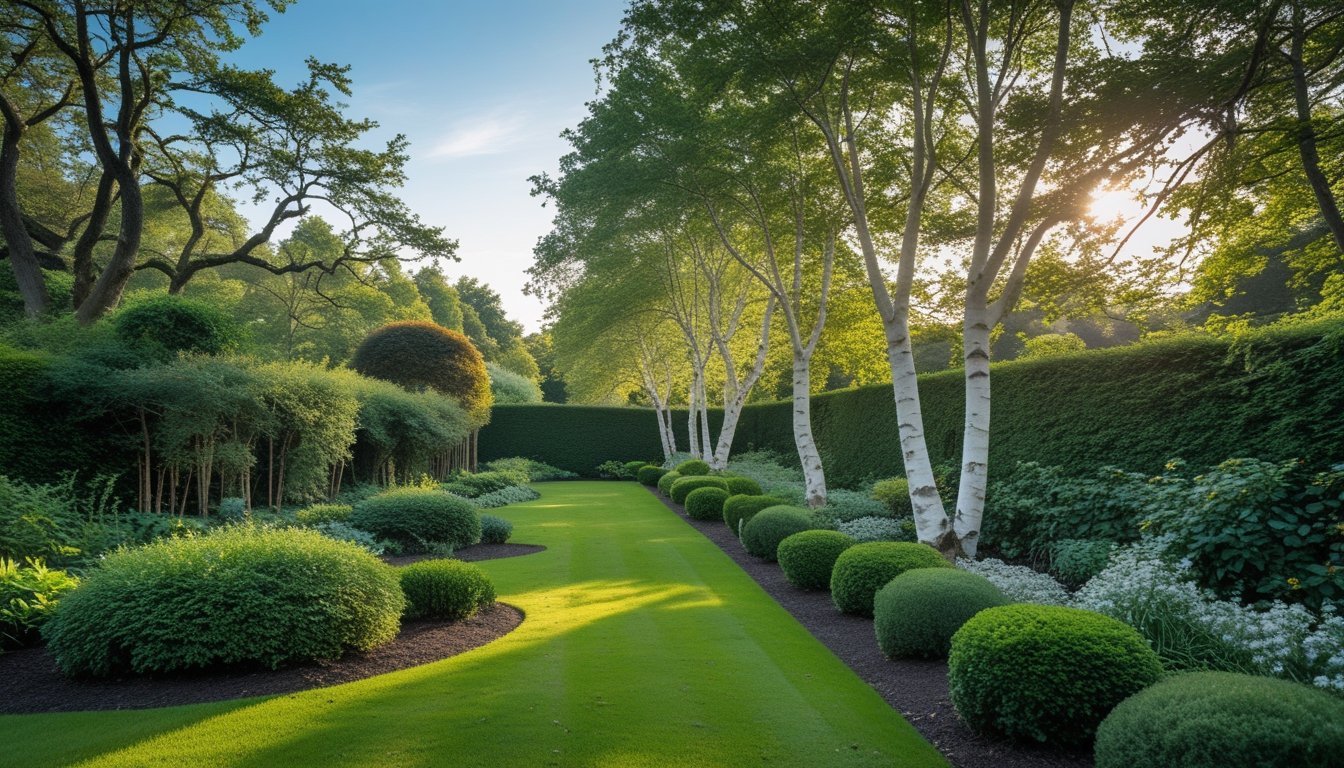Late updated: 13 Oct 2025 10:10
Written by: Emily Thornton
Native UK Trees For Enhancing Garden Privacy: Top Choices and Tips
In our quest to transform gardens into tranquil sanctuaries, native UK trees offer the perfect solution. They not only provide a natural appearance but also support local wildlife and biodiversity. The beauty of using native trees is that they blend seamlessly into the landscape while offering effective privacy solutions.

We understand the desire for privacy, especially in urban areas where homes are often closely packed. Choosing the right trees can make all the difference, creating green oases that shield us from the outside world. Some popular choices include Hornbeam and Field Maple, which are not only fast-growing but also thrive in a variety of soil conditions.
It's essential to consider factors such as sunlight and soil type when planting these trees. They should complement the existing garden while providing the necessary coverage. Our guide will go further into these considerations, helping us choose the best fit for our space.
Key Takeaways
- Native UK trees provide natural and effective privacy.
- They support local wildlife and are ideal for urban gardens.
- Consider sunlight and soil types for optimal growth.
Top Native UK Trees For Enhancing Garden Privacy
For those seeking to enhance their garden’s privacy, native UK trees present an ideal solution by incorporating natural beauty with environmental benefits. Discover which trees maintain year-round privacy, which provide vibrant seasonal barriers, and how to select the perfect species for your specific garden conditions.
Evergreen Species Ideal For Year-Round Screening
Evergreens, such as the common holly (Ilex aquifolium), are excellent for maintaining privacy through all seasons. Their dense foliage ensures that gardens remain shielded from prying eyes, providing a consistent barrier.
The Scots Pine (Pinus sylvestris), with its tall and robust stature, also serves as an all-year privacy solution, especially in larger spaces. These species not only offer privacy but also provide habitats for local wildlife, enhancing the ecological value of your garden.
Best Deciduous Trees For Natural Barriers
Deciduous trees, while not evergreen, create effective natural barriers with their summer foliage. The English Oak (Quercus robur) is a remarkable choice for a majestic blend of privacy and beauty. In autumn, its leaves turn a rich, golden hue before shedding.
Field Maple (Acer campestre) serves as another exemplary deciduous species. Its compact form and vibrant autumn leaves can offer seasonal privacy, making it a cherished addition to any garden focused on both privacy and seasonal aesthetics.
Native Shrubs And Small Trees To Boost Privacy
Native shrubs and small trees can significantly boost garden privacy without occupying much space. The Common Hawthorn (Crataegus monogyna) creates dense thickets that are difficult to penetrate, ideal for boundaries.
Similarly, Blackthorn (Prunus spinosa) not only provides a robust privacy barrier but also features stunning white flowers in spring. These species are particularly useful for smaller gardens where larger trees might not be suitable.
Selecting The Right Tree Species For Your Garden
Selecting the appropriate tree species requires considering various factors such as sunlight, soil type, and garden size. Hornbeam (Carpinus betulus) thrives in clay soil and can be pruned into neat hedges, ideal for formal gardens.
Rowan (Sorbus aucuparia), adaptable to different soils, provides privacy with the added bonus of bright berries that attract birds. Assessing the specific conditions and requirements of our garden is crucial in choosing the right native species to achieve the desired level of privacy.
Key Considerations When Planting Native Privacy Trees

Choosing the right native trees for privacy involves assessing garden size, soil preferences, and adequate maintenance. Each factor plays a critical role in ensuring the health and efficacy of your garden's privacy solution.
Garden Size And Tree Maturity
Garden size greatly affects the choice of trees we plant. Larger spaces allow for trees that spread out and grow taller, such as Hornbeam or Rowan. In smaller gardens, we might prefer trees like Field Maple that maximise privacy without overwhelming the garden space.
Tree maturity also impacts planning. Mature trees provide immediate privacy benefits. However, smaller saplings offer a chance for us to nurture their growth over time. It's crucial to consider how each tree will mature to avoid overcrowding or excessive shading.
Landscape architecture integrates these elements, balancing immediate visual appeal with future growth. Planning also takes into account seasonal interest, ensuring trees contribute beauty throughout the year.
Soil Preferences And Site Selection
Selecting the correct site within the garden hinges on soil conditions, an often overlooked yet vital aspect. Each native tree species has particular soil preferences. For example, the Woodland Trust offers resources for understanding which trees thrive in clay, sandy, or loamy soils.
Testing soil before planting informs us of its acidity or alkalinity, guiding tree selection. Some species demand specific conditions, while others are more adaptable. Ensuring the correct site selection minimizes stress on the trees, promoting robust growth and enhancing biodiversity.
When preparing the site, we should consider mulching to retain moisture and improve soil quality. This step lays a healthy foundation for newly planted trees.
Maintenance, Pruning And Tree Care
Proper maintenance is key for the thriving of our privacy trees. Regular pruning not only shapes the trees but also facilitates healthier growth by removing dead or diseased wood. Pruning helps us enhance the structure and extend the trees' lifespan.
Effective tree care involves routine checks for pests and diseases. By addressing issues early, we can ensure the trees remain a robust privacy screen. Consistent maintenance tasks, like watering during dry spells, guarantee optimal growth conditions.
Gardening is an ongoing commitment, where regular care helps sustain the garden's aesthetics and functionality. By integrating these considerations, our native privacy trees will enhance the garden's beauty and utility for years to come.
Frequently Asked Questions

As we explore native UK trees for enhancing garden privacy, we cover key considerations like the best species for privacy screens, growth rates, and suitability for small gardens. We also touch on tree maintenance, legal concerns, and options for evergreen privacy.
What are the best native UK tree species for creating a natural privacy screen in a garden?
Hornbeam, Field Maple, and Rowan are excellent choices. They provide a dense canopy and support local wildlife. These trees are well-adapted to UK climates, making them ideal for eco-friendly privacy solutions.
How fast do indigenous UK trees grow, and which are the quickest for achieving privacy?
Indigenous trees like the Silver Birch grow quickly. They can reach impressive heights in a few years. Hornbeam also grows at a moderate pace, offering privacy sooner than many others.
Which native British trees are suitable for small gardens to enhance privacy without taking up too much space?
Rowan and Cherry trees thrive in small spaces. Their moderate size and manageable spread make them perfect for small gardens. They provide privacy without overwhelming the area.
How to maintain and prune UK native trees to ensure maximum privacy?
Regular maintenance is crucial for privacy. Pruning should focus on shaping and encouraging dense growth. It’s best to prune during dormancy to promote vigorous new growth in spring.
What are the legal considerations when planting trees for privacy in a UK garden?
Be aware of property lines and potential disputes with neighbours. Consulting local council guidelines is important, especially concerning tree height and distance from boundaries to avoid legal issues.
Could you suggest any evergreen native trees that are effective for garden privacy throughout the year?
Holly and Scots Pine are evergreen options that offer consistent privacy. They retain foliage year-round, ensuring privacy through every season while supporting local ecosystems.
